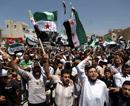
London, June 13: Despite an escalating conflict in Syria and mounting civil unrest in Europe, the world became a more peaceful place in the last year, said a study marking particular improvement in Africa.
The Global Peace Index, produced by the Australia and US-based Institute for Economics and Peace, showed its first improvement in two years. For the first time, sub-Saharan Africa was no longer the world's least peaceful region, losing that dubious distinction to West Asia and North Africa in the aftermath of the “Arab Spring”. The survey studied 23 indicators across 158 countries, ranging from measures of civil unrest and crime to military spending, involvement in armed conflict and relations with neighbors. Aside from the deterioration in West Asia, every other region in the world showed at least some form of improvement.
Overall, survey founder Steve Killelea — an Australian entrepreneur who created the initial index six years ago — said there appeared to be several key drivers. Overall, global military spending looked to be beginning to fall - in part a consequence of the global financial crisis — while relations between countries were broadly improving, with leaders increasingly turning to diplomacy not violence.
“The improvement in relation with the states and a greater reluctance to resort to war is very profound, particularly in Africa,” he said. “You've seen a very significant reduction in conflict ... When I first went to Uganda 15 years or so ago, for example, they were fighting four wars. Now they are fighting none.”
The sharpest deterioration in peace, the report showed, took place in Syria, with several other countries in the region falling down the list. The uprising against Syrian leader Bashar al-Assad has become increasingly bloody particularly in recent weeks.
Last year's report showed violence linked to the “Arab Spring” had made the world a less peaceful place, while the 2010 study showed economic hardship driving up global unrest. Those two years undid three years of improvements, with the level of global peace in 2012 now almost exactly that of six years earlier, Killelea said. Somalia remained the world's least peaceful place, the report added.





Comments
Add new comment